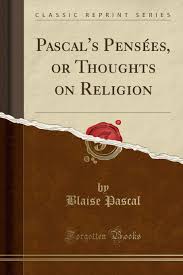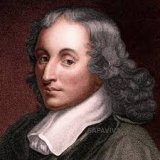Pensées Page #15
The Pensées is a collection of fragments on theology and philosophy written by 17th-century philosopher and mathematician Blaise Pascal. Pascal's religious conversion led him into a life of asceticism, and the Pensées was in many ways his life's work. The Pensées represented Pascal's defense of the Christian religion.
104 When our passion leads us to do something, we forget our duty; for example, we like a book and read it, when we ought to be doing something else. Now, to remind ourselves of our duty, we must set ourselves a task we dislike; we then plead that we have something else to do, and by this means remember our duty. 105 How difficult it is to submit anything to the judgment of another, without prejudicing his judgment by the manner in which we submit it! If we say, "I think it beautiful," "I think it obscure," or the like, we either entice the imagination into that view, or irritate it to the contrary. It is better to say nothing; and then the other judges according to what really is, that is to say, according as it then is, and according as the other circumstances, not of our making, have placed it. But we at least shall have added nothing, unless it be that silence also produces an effect, according to the turn and the interpretation which the other will be disposed to give it, or as he will guess it from gestures or countenance, or from the tone of the voice, if he is a physiognomist. So difficult is it not to upset a judgment from its natural place, or, rather, so rarely is it firm and stable! 106 By knowing each man's ruling passion, we are sure of pleasing him; and yet each has his fancies, opposed to his true good, in the very idea which he has of the good. It is a singularly puzzling fact. 107 Lustravit lampade terras.[63]--The weather and my mood have little connection. I have my foggy and my fine days within me; my prosperity or misfortune has little to do with the matter. I sometimes struggle against luck, the glory of mastering it makes me master it gaily; whereas I am sometimes surfeited in the midst of good fortune. 108 Although people may have no interest in what they are saying, we must not absolutely conclude from this that they are not lying; for there are some people who lie for the mere sake of lying. 109 When we are well we wonder what we would do if we were ill, but when we are ill we take medicine cheerfully; the illness persuades us to do so. We have no longer the passions and desires for amusements and promenades which health gave to us, but which are incompatible with the necessities of illness. Nature gives us, then, passions and desires suitable to our present state.[64] We are only troubled by the fears which we, and not nature, give ourselves, for they add to the state in which we are the passions of the state in which we are not. As nature makes us always unhappy in every state, our desires picture to us a happy state; because they add to the state in which we are the pleasures of the state in which we are not. And if we attained to these pleasures, we should not be happy after all; because we should have other desires natural to this new state. We must particularise this general proposition.... 110 The consciousness of the falsity of present pleasures, and the ignorance of the vanity of absent pleasures, cause inconstancy. 111 Inconstancy.--We think we are playing on ordinary organs when playing upon man. Men are organs, it is true, but, odd, changeable, variable [with pipes not arranged in proper order. Those who only know how to play on ordinary organs] will not produce harmonies on these. We must know where [the keys] are. 112 Inconstancy.--Things have different qualities, and the soul different inclinations; for nothing is simple which is presented to the soul, and the soul never presents itself simply to any object. Hence it comes that we weep and laugh at the same thing. 113 Inconstancy and oddity.--To live only by work, and to rule over the most powerful State in the world, are very opposite things. They are united in the person of the great Sultan of the Turks. 114 Variety is as abundant as all tones of the voice, all ways of walking, coughing, blowing the nose, sneezing. We distinguish vines by their fruit, and call them the Condrien, the Desargues, and such and such a stock. Is this all? Has a vine ever produced two bunches exactly the same, and has a bunch two grapes alike? etc. I can never judge of the same thing exactly in the same way. I cannot judge of my work, while doing it. I must do as the artists, stand at a distance, but not too far. How far, then? Guess. 115 Variety.--Theology is a science, but at the same time how many sciences? A man is a whole; but if we dissect him, will he be the head, the heart, the stomach, the veins, each vein, each portion of a vein, the blood, each humour in the blood? A town, a country-place, is from afar a town and a country-place. But, as we draw near, there are houses, trees, tiles, leaves, grass, ants, limbs of ants, in infinity. All this is contained under the name of country-place. 116 Thoughts.--All is one, all is different. How many natures exist in man? How many vocations? And by what chance does each man ordinarily choose what he has heard praised? A well-turned heel. 117 The heel of a slipper.--"Ah! How well this is turned! Here is a clever workman! How brave is this soldier!" This is the source of our inclinations, and of the choice of conditions. "How much this man drinks! How little that one!" This makes people sober or drunk, soldiers, cowards, etc. 118 Chief talent, that which rules the rest. 119 Nature imitates herself. A seed sown in good ground brings forth fruit. A principle, instilled into a good mind, brings forth fruit. Numbers imitate space, which is of a different nature. All is made and led by the same master, root, branches, and fruits; principles and consequences. 120 [Nature diversifies and imitates; art imitates and diversifies.] 121 Nature always begins the same things again, the years, the days, the hours; in like manner spaces and numbers follow each other from beginning to end. Thus is made a kind of infinity and eternity. Not that anything in all this is infinite and eternal, but these finite realities are infinitely multiplied. Thus it seems to me to be only the number which multiplies them that is infinite. 122 Time heals griefs and quarrels, for we change and are no longer the same persons. Neither the offender nor the offended are any more themselves. It is like a nation which we have provoked, but meet again after two generations. They are still Frenchmen, but not the same. 123 He no longer loves the person whom he loved ten years ago. I quite believe it. She is no longer the same, nor is he. He was young, and she also; she is quite different. He would perhaps love her yet, if she were what she was then. 124 We view things not only from different sides, but with different eyes; we have no wish to find them alike.
Translation
Translate and read this book in other languages:
Select another language:
- - Select -
- 简体中文 (Chinese - Simplified)
- 繁體中文 (Chinese - Traditional)
- Español (Spanish)
- Esperanto (Esperanto)
- 日本語 (Japanese)
- Português (Portuguese)
- Deutsch (German)
- العربية (Arabic)
- Français (French)
- Русский (Russian)
- ಕನ್ನಡ (Kannada)
- 한국어 (Korean)
- עברית (Hebrew)
- Gaeilge (Irish)
- Українська (Ukrainian)
- اردو (Urdu)
- Magyar (Hungarian)
- मानक हिन्दी (Hindi)
- Indonesia (Indonesian)
- Italiano (Italian)
- தமிழ் (Tamil)
- Türkçe (Turkish)
- తెలుగు (Telugu)
- ภาษาไทย (Thai)
- Tiếng Việt (Vietnamese)
- Čeština (Czech)
- Polski (Polish)
- Bahasa Indonesia (Indonesian)
- Românește (Romanian)
- Nederlands (Dutch)
- Ελληνικά (Greek)
- Latinum (Latin)
- Svenska (Swedish)
- Dansk (Danish)
- Suomi (Finnish)
- فارسی (Persian)
- ייִדיש (Yiddish)
- հայերեն (Armenian)
- Norsk (Norwegian)
- English (English)
Citation
Use the citation below to add this book to your bibliography:
Style:MLAChicagoAPA
"Pensées Books." Literature.com. STANDS4 LLC, 2024. Web. 25 Nov. 2024. <https://www.literature.com/book/pens%C3%A9es_114>.




Discuss this Pensées book with the community:
Report Comment
We're doing our best to make sure our content is useful, accurate and safe.
If by any chance you spot an inappropriate comment while navigating through our website please use this form to let us know, and we'll take care of it shortly.
Attachment
You need to be logged in to favorite.
Log In